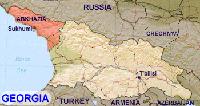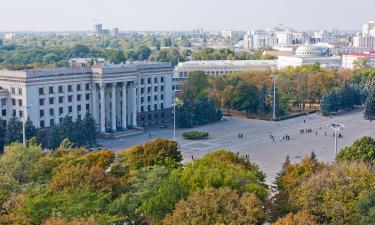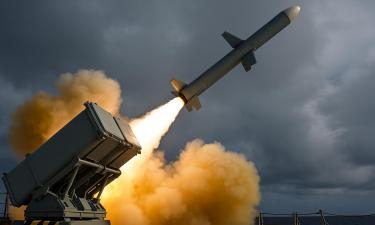Western press lashes out against Russia
European press is glistening with catchy headlines about the conflict between Moscow and Saakashvili’s regime.

“Putin’s imperial policy,” attempts of a “Russian bear” to force Georgia down to its knees, cruel punishment for Tbilisi’s pro-Western tendencies – such creative collection of titles leaves a doubtless impression. One can’t help a feeling that the western commentators intentionally deceive the unsuspecting readers who are not very familiar with the actual course of this conflict.
Here are some of the opinionated responses to the recent events in Georgia from the influential sources.
FAZ (Germany)
Russia is currently teaching Transcaucasia a lesson. Georgia is playing the pupil’s part but even the Europeans have an opportunity to learn something about the neo-imperial policy of Valdimir Putin. It appears that Moscow was eagerly awaiting the spying scandal in order to remind the daring Saakashvili about the superpower’s hammer pending over his head.
Such paralyzing means as transport blockades and freezing of monetary transfers is not merely Russia’s revenge for the four soldiers temporally taken into custody. Rather in this case Georgia is paying the price for its western direction just like Ukraine did before it. Who would dare to aim for the European Union membership without seeking Russia’s permission first? Above all else this has to do with the renewed geopolitical rivalry between Russia and the United States.
Dziennik (Poland)
Moscow cannot allow the thought of letting Tbilisi out of its control zone. Therefore it tries t weaken the government, encourages the separatists in Southern Osetia and Abhazia, which both constitute part of Georgia, and introduces yet more sanctions.
Lidove Noviny (Czech Republic)
Western wind began to blow towards Russia from the Black Sea’s coast. Georgia wants to join the NATO possibly before 2009, and this bothers the Russian politicians. Some State Duma deputies demanded that all relations with Georgia be severed, and president Putin has granted their demands a practical form. He is trying to force Tbilisi on its knees by using an economic blockade – all in order to bring the Georgians back under Moscow’s influence. The disturbed Russian bear insists that he must be obeyed.
Guardian (Great Britain)
One way or another Putin will have to accept the Soviet Empire’s collapse and loss of power. He has already pressured Georgia long enough in his multiple attempts to incline the country’s government towards his Russian agenda. Now is the time to stop. The never-written agreement about Latin America being a U.S. attachment has long since lost its power and credibility. The same applies to Russia when it comes to its relations with the former Soviet republics. Moscow must understand this.
Georgia is an independent nation with a right to make its own choices. And given the treatment it hasbeen receivingfrom Russia for the past two centuriesit isno surprise that Tbilisi turns towards the West. So Putin needs to find a way to cope with reality.
That is how the situation is presented in the European press.
Media materials from various countries both in Western and Eastern Europe covering the events inside and outside of Georgia resemble the job of soccer match radio commentators when the listeners can only imagine what happens down on the field based on their words.
The same idea is being repackaged with slight variations and presented to the reader, who unconsciously begins to perceive Moscow’s sanctions in a personal way and gets pretty much deceived.
But the general tone of these articles is perplexed. No one seems to have expected such behavior from Russia. After following the developments around the conflict Europe waited for Kremlin to simply swallow another Georgian offense. Instead they got the opposite.
The German commentator immediately recalled that Russia is a superpower. He is outraged that Moscow “takes revenge” for its four officers who were arrested in Tbilisi. When two months ago Israel bombed an entire nation back into Middle Ages because of two soldiers the press showed much more understanding.
According to the German analyst Georgia strives to join the NATO and the European Union and gets penalized by Russia. But it is enough to cast one honest look at Saakashvili’s actions and it will become clear that Russia is protecting these organizations from becoming degraded.
The Polish media are arguing against “influence” and “pressure” as usual. Our favorite and painfully familiar topic. The only news is that Moscow is trying to debilitate the nation’s government. But wait a minute, there is nothing there to debilitate. Georgia has a collapsed economy and a satisfied army.
The Russian bear’s motive is the only thing that helps distinguish between Czech and Polish versions.
The Guardian commentator contemplates the future and speculates about the means of pressure aimed at re-orienting Georgia towards Russia. However, it is not appropriate for a serious newspaper to equate Latin America with former USSR republics. If one chooses to draw comparisons it needs to be done in a more sophisticated form, preferably taking into account the history of Russian State. After all Georgia begged to be included into the mentioned empire for 70 years. It wasn’t easy.
And now on top of everything Russia is accused of mistreating Georgia for the past two centuries, causing it to turn to the West. Perhaps one should note that during the Soviet times Georgia gave to the Union’s budget one-third of what it took out. Even today swarms of Georgian workers in search of jobs roam the Russian territories rather than the British. What might be the cause of this?
Vladimir Anohin
Translated by Natalia Vysotskaya
Pravda.ru
Subscribe to Pravda.Ru Telegram channel, Facebook, RSS!



